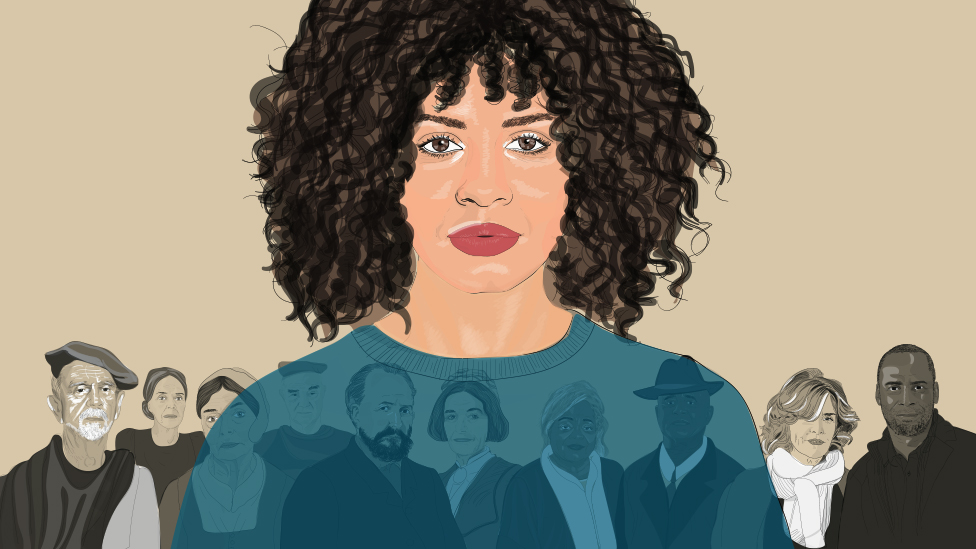Covid: When will it be over and we can do this again?
By James Gallagher
Health and science correspondent
-
- Published

A miserable year of not seeing friends and family, weddings cancelled, children missing school, freedoms curtailed, careers ended, a pervading sense of gloom and, sadly, many lives lost.
So when can we expect to get back to normal? Do we just have to stick out the winter, before
Health Secretary Matt Hancock's "cavalry" - a vaccine, mass testing, better treatments - arrives, and everything is fine?Or will Covid be with us for years, even decades, to come?
"We might be back to some semblance of normality by summer time next year," says Prof Julian Hiscox, from the University of Liverpool. "But we won't be 'back to 2019' for five years," he predicts.
Some scientists believe that to manage the virus, our way of life may need to change forever.
Our final destination
If we could skip ahead several years, the mostly widely held view is the virus will still be around - as what's known as an endemic infection.
But that is not to say life will be the same as it is now. We should have reached a new relationship with the virus where it is significantly less disruptive to our lives. This follows the pattern of previous pandemics.
A vaccine or multiple infections across a lifetime may give enough immunity to stop the virus being as deadly.
"This will settle down over decades," says Prof Mark Woolhouse, from the University of Edinburgh. "The problem is what happens over those decades. I don't see a route that isn't painful in one way or another."
The summer we've just had provides hope, especially as a lot more of us will have had Covid
The next few months
First, we have to get through winter and the expectation is it will be rough.
Winter is party time for respiratory infections anyway, as we spend more time indoors and the cool temperatures help viruses survive.
The government is firefighting a virus that will spread rapidly if restrictions are eased too much. The UK has already gone from a very quiet summer to averaging more than 22,000 cases a day. The virus is currently spreading four times faster than the government's worst-case scenario which predicted a second wave could be more deadly than the first.
Quite what Christmas is going to be like is still hard to call.
Optimism for spring
Spring is likely to bring three improvements:
- Better weather, allowing people to spend more time outdoors where it is harder for the virus to spread
- Increased immunity levels, after more people have been infected over winter
- Vaccination - we should have started rolling this out
"I think the summer we've just had provides hope that cases will reduce, especially as a lot more of us will have had Covid," says Prof Christina Pagel, from University College London. "We're not even in this winter yet, that's what's depressing."
She is "pretty sure" we're heading for another lockdown.
"If up to 20% of people had Covid, it would slow things down and we should see a big drop-off, even if there isn't a vaccine."
I don't think it will settle down at all in the next 18 months
However, there is uncertainty here. The virus was able to spread with ease last spring and cases, while remaining low, did start increasing again over the summer.
"A third wave is certainly possible," says Prof Woolhouse. "And if neither the second nor the third waves are anything like big enough to induce herd immunity, and we don't have a vaccine, then a fourth wave is possible.
"I don't think it will settle down at all in the next 18 months."

- VACCINE: How close are we to finding one?
- GLOBAL SPREAD: How many worldwide cases are there?
- THE R NUMBER: What it means and why it matters

The first vaccines are unlikely to be perfect
It is important to be realistic about what a vaccine could achieve next year. Vaccines coupled with better treatments, as I wrote as we went into lockdown, remain the one true exit strategy.
There are 11 vaccines around the world that are in the final stages of testing. We are waiting for results to understand how effective they are, what kind of protection they offer and how long that might last.
Vaccines for other diseases vary. Some stop you catching the infection, others just make the disease less severe and not everybody responds in the same way. Members of the government's scientific advisory group hope to get data soon on how a Covid vaccine performs.
But we should not expect a magic bullet.
Prof Hiscox is "moderately optimistic" the first generation of vaccines will keep some people out of hospital, but "won't necessarily" stop people from catching and spreading the virus. And he warns that some of the people most vulnerable to Covid, such as the elderly, might get the least protection from a vaccine.
For Prof Woolhouse, a vaccine "would clearly be a game-changer". But the history of medical research shows it is "unwise" to rely on it arriving on time. Even then he is "nervous about the logistics" of vaccinating millions of people. A vaccine will lead to some "really difficult decisions", he says, about lifting restrictions when people may not be completely protected.
Normality will still take time
We are already closer to normal than we were in lockdown - schools are open and, with the exception of Wales, where there is a two-week "firebreak", we are not being told to stay at home.
Some degree of social distancing is likely to continue even with a vaccine next year, says Prof Hiscox, but it will be "less stringent". He also believes at-risk groups may still need to "shelter" themselves, or take extra precautions, because of uncertainty about the amount of protection.
"What you might not be able to do is be an 18-year-old back from university who goes and hugs granny who is 85," he says.
But he warns that going back to normality will require a vaccine that both stops people getting sick and prevents them spreading the virus. That, he says, will take five years.
"For most people," says Prof Woolhouse, "I suspect life has changed to some degree forever, I don't think there is a going back.
"There is a 'new normal'."
In his optimistic view, that means there's sufficient immunity to make transmission rates low, so there is no "crisis", but we would still need to keep wearing face coverings, be extra careful with hand hygiene and socially distance.
"And we stay used to that for years or decades until it really does settle down. The second wave is absolutely not the end of it."
For Prof Pagel, it is "possible Covid might become like an annual flu, more people will be fine than now". But that would make winter tougher than we're used to, she says, and would pile pressure on hospitals which would be essentially facing a "double flu season".
You may also be interested in:

This is Jasmine. Just like us, her ancestors survived a number of pandemics. So, how do pandemics end?
"again" - Google News
October 31, 2020 at 07:22AM
https://ift.tt/3kPco48
Covid: When will it be over and we can do this again? - BBC News
"again" - Google News
https://ift.tt/2YsuQr6
https://ift.tt/2KUD1V2
Bagikan Berita Ini














0 Response to "Covid: When will it be over and we can do this again? - BBC News"
Post a Comment